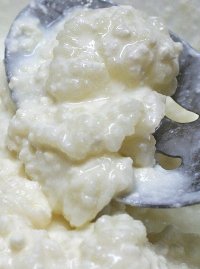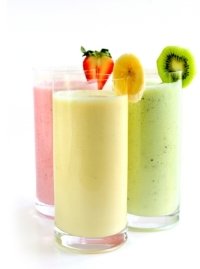Is Kefir Halal? – Kefir Health Drink
Well the good news is that, yes, not only is kefir halal but it is also a product that we recommend should be a part of everyone’s daily diet. It’s importance is such that recent medical research has backed up it’s health orientated benefits and even major dietary companies are now accepting it’s contribution to a healthy lifestyle.
The Kefir health drink is much under estimated and has so many untapped benefits.
But What is Kefir?
 Kefir is a fermented milk beverage which is made from Kefir grains and rich with friendly bacteria known as probiotics. These are not the normal grains that we know like wheat, but are a combination of yeast and bacteria. They cannot be manufactured thus they are as healthy as you can get.
Kefir is a fermented milk beverage which is made from Kefir grains and rich with friendly bacteria known as probiotics. These are not the normal grains that we know like wheat, but are a combination of yeast and bacteria. They cannot be manufactured thus they are as healthy as you can get.
They look like cauliflower florets and can be used over and over again. These grains are then used to ferment the milk to form Kefir drink. While Kefir and yoghurt are both cultured milk products, they contain different strains of microorganisms. Kefir contains over thirty strains of good bacteria.
The yoghurt that we buy from stores probably has only one or two strains of bacteria. Kefir is also much lighter than yoghurt and is sold as a drink. It is more nutritious than yoghurt and supplies complete protein, minerals and vitamin B.
Scientists have studied Kefir and discovered that it does not have a single bad bacterium. In fact when E.coli was injected into Kefir, the probiotics killed it, meaning that pathogens cannot exist in Kefir.
Where Did Kefir Originate From?
There are many views on the origins of this great drink but all link to roughly the same region. Kefir, pronounced as keh’-feer, has also been referred to as ‘Grains of the Prophet Mohammed’ or ‘Drink of the Prophet’.
Kefir comes from the Turkish word, ‘Keif’ which when translated means, ‘feeling good’ or ‘good feeling’. It is named Keif for the sense of well being that a person feels after drinking Kefir. Kefir was discovered more than a thousand years ago when nomadic shepherds in the Caucasus mountains of Eastern Europe found that the milk they carried in leather pouches occasionally fermented into a creamy, effervescent drink.
Traditional Kefir was made by hanging the leather pouches containing milk and Kefir grains on the doorway so that each time somebody passed through the doorway, they would knock the leather pouch, thus shaking the contents and ensuring that the Kefir remained well mixed.
So How Does Kefir Work?
Kefir contains actively growing bacteria and yeast. Daily consumption of Kefir balances a person’s intestinal eco-system, which in turn provides for a healthy inside and effective digestive system.
Fermented foods like Kefir are packed with enzymes. The body needs a certain amount of enzymes to properly digest the food and then extract the nutrients from the food that we eat. As we age the body’s supply of enzymes decreases significantly. Having a supply of enzymes in your gut is highly beneficial and drinking Kefir supplies you with those enzymes.
Kefir also produces large quantity of lactic acid which increases the digestion of milk while inhibiting harmful microorganisms.
Kefir added benefits are that it works in the body by controlling the production of toxins and their effects on vital organs and body cells.
Types of Kefir
There are two varieties of Kefir grains.
Water Kefir
Water Kefir has a sweeter taste as compared with milk Kefir. But the longer you ferment it, the sweetness will disappear. It also tends to have a slightly fermented flavour.
It has a yellowish crystal colour with a fizzy bubbly appearance. Water Kefir is non-dairy and is made with fruit juices, coconut water, organic sugar water or filtered water. Tap water is not used to make water Kefir as the chlorine and fluorine in tap water will destroy the Kefir.
Water Kefir can be used as a base for a variety of fruit gelatine desserts, salad dressings, popsicles, and non-dairy smoothies.
Although water Kefir contains fewer strains of bacteria and yeasts than milk Kefir, it still has far more than yogurt.
Milk Kefir
Milk Kefir has a strongly flavoured cultured milk taste depending on the level of fermentation. Generally, well fermented Kefir has a sourer or tart taste and can be a little bit carbonated.
It has a white creamy cauliflower like appearance when thick but will change appearance over time. Cow milk is the most commonly used form although you can also use other dairy sources like goat milk, sheep or camel milk.
Milk Kefir can be consumed plain or it can be flavoured for those who find the natural taste too Strong. Most people find that milk Kefir is an acquired taste but over time, your taste buds do get accustomed to it. It can also be used as a base for salad dressings and smoothies. It is also a great alternative for butter, buttermilk or yogurt.
How to Make Milk Kefir
Making your own Kefir can be more advantageous than buying commercial Kefir. For starters it is cheaper to make your own since the milk Kefir grains have an unlimited life span when cared for properly.
All you have to do is move them after twenty four hours when one batch of milk has finished culturing to another batch of fresh milk. Homemade Kefir also contains a larger number of probiotics and you have control over the type of milk you prefer to use.
 These are the simple steps to follow when making homemade Kefir. Once you followed this process a couple of times it will become second nature.
These are the simple steps to follow when making homemade Kefir. Once you followed this process a couple of times it will become second nature.
You will need:
1) A glass jar or jug – a pint or litre size is fine.
2) A tablespoon of Kefir grains
3) Fresh milk
Directions:
• Place the Kefir grains into the glass jar
• Fill it with milk about a third full
• Cover the glass jar with cloth secured by a rubber band or a lid
• Let the contents stand at room temperature for about twenty four hours. More than that will produce a thicker and sourer drink. The time of year also affects how quickly the culture works. In the warm summer months the Kefir will ferment faster than in the cold winter months.
• When the Kefir milk is ready scoop out the grains with a wooden spoon or use clean hands and transfer them to a fresh batch of milk – Do not throw the grains.
Some people prefer to drink their Kefir plain however you may add vanilla, fruits, ginger or any other flavouring for added flavouring
• Store the ready Kefir in a refrigerator. It may also be stored at room temperature for one to two days. Alternatively you can freeze it for as long as you like.
Milk Choice
You can make milk Kefir from just about any kind of milk, but it’s important to give your Kefir grains a period of adjustment when you switch from one type of milk to another.
Raw or Pasteurized – Raw milk has a very heavy bacterial load that can sometimes compete with or dominate the bacteria in your grains. When you obtain new grains, give them a couple weeks in their original milk, and then split the grains. Run them through the normal Kefir fermentation for a couple weeks and see how they’re doing and continue to maintain a batch in the pasteurized milk.
After several batches, take note: Have your grains shrunk or grown. If they seem to be thriving after several batches, they are in good shape and you can continue using them
Animal – Goat milk Kefir has a unique and delicious taste. Cow’s and camel’s milk works great too.
Non-Dairy – Non-dairy milks do not contain lactose and are therefore inadvisable. If you dislike dairy or can only tolerate small amounts, you can use a very small amount of finished milk Kefir to culture your non-dairy milks.
Do’s and Don’ts of Kefir Use
• As mentioned above, never work with tap water when making water Kefir. The chemicals in tap water will damage the Kefir. Instead use filtered water.
• Metals also should not come in contact with your Kefir. Use wooden, glass or plastic utensils to stir and move Kefir. Glass is a favourite because it is easy to clean and sterilize.
• Do not freeze your Kefir grains. Freezing halts or stops fermentation and some grains are difficult to wake up after putting them in a freezer.
• Always cover the jar with a cloth or a lid to avoid contamination.
• Feed the grains with new fresh milk every twenty four hours to make sure they stay alive and active.
Note: Kefir grains are living culture and thus maintaining hygiene is crucial. Clean your hands thoroughly before starting and make sure the jars you are using are clean too.
How to Take Kefir
Kefir can be consumed in several ways:
1 – As a plain drink and if you like you can add the flavourings that you prefer.
 2 – Make a smoothie with Kefir. For those who want the benefits of Kefir but not the taste. Combine Kefir milk with fresh and frozen fruits to create a thick ice cold texture.
2 – Make a smoothie with Kefir. For those who want the benefits of Kefir but not the taste. Combine Kefir milk with fresh and frozen fruits to create a thick ice cold texture.
Choose whichever delicious combination of fruits that you like. A smoothie Kefir breakfast is fun and packed with nutrition.
3 – Make popsicles from the smoothies or freeze the plain Kefir and you have ice cream, delicious and cooling in those hot summer months.
4 – Kefir cheese contains all the beneficial probiotics that Kefir is known for. Milk Kefir can also be made into cheese Kefir by straining to remove the whey, making a variety of cheese ranging from soft spreadable Kefir cheese to a cream cheese Kefir or a hard cheese Kefir.
5 – Salad dressing- Use Kefir in place of yoghurt in yoghurt based salad dressings.
Benefits of Kefir
Gastrointestinal Disorders: Kefir prevents gastrointestinal disorders such as irritable bowel syndrome, constipation, ulcers, reflux, hepatitis, gastritis, colon cancer and leaky gut syndrome. There are over four hundred strains of bacteria living in your intestines and a healthy balance is required for both bad and good bacteria. The probiotics in Kefir help to maintain that balance.
Anti Aging: Studies have shown that people from the Caucasus regions who took a regular diet of Kefir lived active lives for a hundred or more years. Kefir has anti-aging and anti-inflammatory properties. Additionally you can use Kefir as a cleanser, hand cream, as a hair conditioner or even as a moisturiser.
Keeping Calm: Kefir contains tryptophan, an essential amino acid known for its calming effect on the nervous system. This helps to keep depression at bay.
Lactose Intolerance Friendly: Kefir can be drunk by people who are lactose intolerant because the yeasts and bacteria eat up all the lactose in the milk.
 Weight Loss: One serving of Kefir wards off hunger pangs and keeps you feeling full for longer periods. Kefir has also been known to eliminate cravings thus you are able to resist junk food and snacks.
Weight Loss: One serving of Kefir wards off hunger pangs and keeps you feeling full for longer periods. Kefir has also been known to eliminate cravings thus you are able to resist junk food and snacks.
Digestion: Kefir aids in proper digestion of food- Kefir, as with most fermented foods, is rich with enzymes which extract nutrients from the foods that we eat.
Better Bones: Builds bone density by providing much needed calcium to the bones.
Allergies: Kefir is known to fight allergies. For example hay fever sufferers who regularly drink Kefir have reported a decrease in severity of their symptoms after exposure to grass pollen.
Kills Candida: This yeast that is present in the body but when the balance is upset it causes yeast infections especially in women.
Detox: Detoxifies the body. We hear all the time how we should regularly detox our bodies, this is a constant detox.
Fights cancer: Studies have shown that regular consumption of Kefir can kill cancer cells and stop the growth of those cancer cells. Milk Kefir has been found to play a role in the prevention and treatment of bladder cancer, breast cancer and colon cancer. Indeed, research has proven that milk Kefir may be one of the leading foods in the prevention of cancer.
A Word of Caution
If you are a beginner to Kefir, start slowly then slowly increase your quantity. Your body may need time to adjust to the increased beneficial bacteria in your system. As with any new dietary addition there may be possible side effects. These will usually only last for only a short time and include:
- Nausea
- Headaches
- Diarrhoea
- Flu like symptoms
- Cramping
- Bloating
A relatively healthy person may find that they hardly experience any side effects, but even if you do, remember they are temporary and Kefir milk benefits surpass any discomforts you may initially experience. However if these discomforts become uncomfortable, skip the Kefir milk for a day and also reduce the quantity you are drinking.
Buying Kefir
Big health companies have caught onto the benefits of healthy bacteria and the number of these drinks available is increasing all the time. However take note – most of these commercialized drinks have had a substantial amount of goodness taken out therefore limiting the benefits.
 One of the better products available at stores currently is The Natural Polski milk Kefir found at Tesco. This has a good level of acidity and is very creamy. It is also closer to natural Kefir than most other commercial products that are available in the high street.
One of the better products available at stores currently is The Natural Polski milk Kefir found at Tesco. This has a good level of acidity and is very creamy. It is also closer to natural Kefir than most other commercial products that are available in the high street.
Kefir can be found in the refrigerated dairy section as Kefir is a fresh product with live cultures, it should be kept refrigerated. After opening Kefir, it should be consumed within five to seven days.
So now you know what it it and the associated benefits – what are you waiting for? Go get some Kefir!
